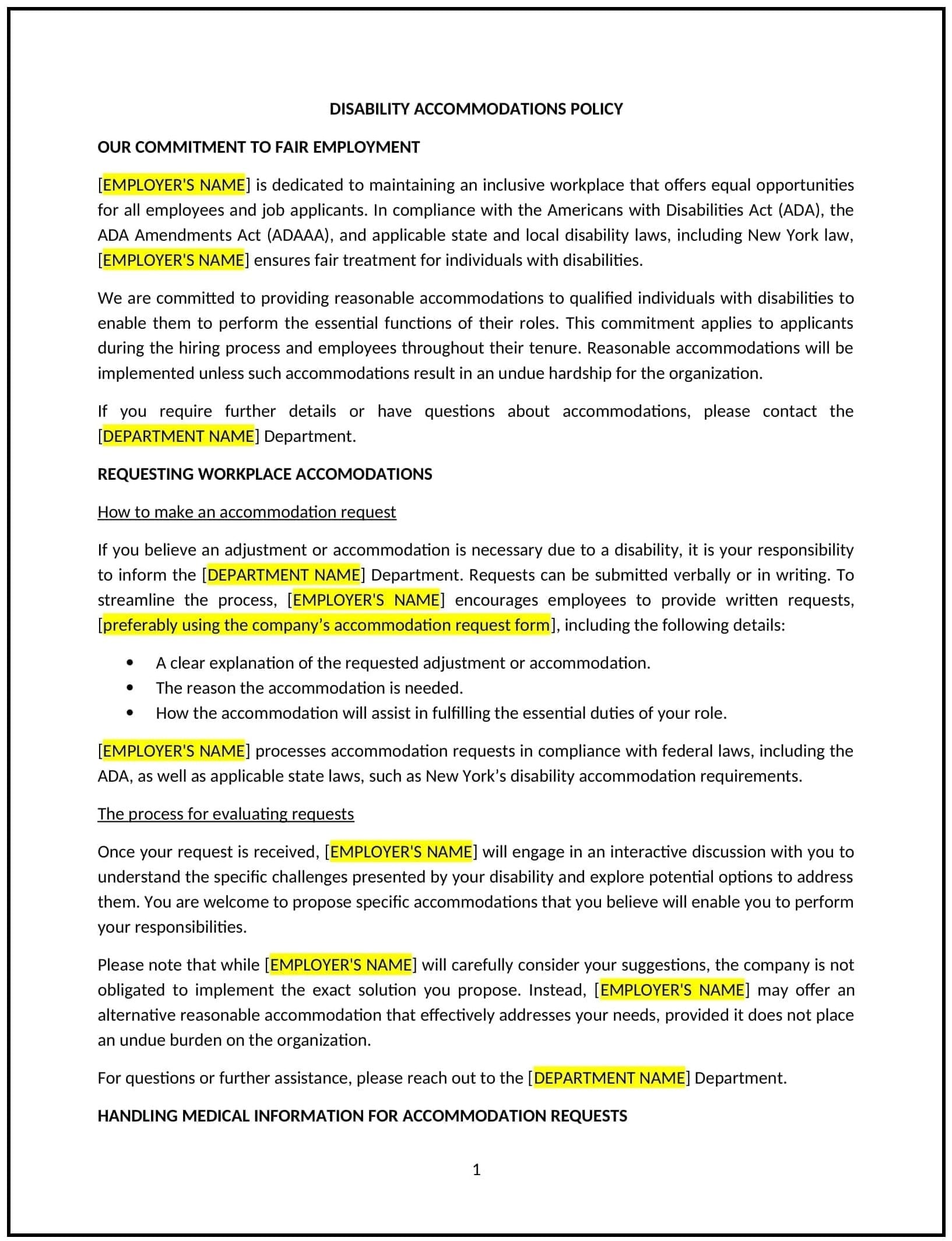Disability accommodations policy (New York): Free template
Got contracts to review? While you're here for policies, let Cobrief make contract review effortless—start your free review now.

Customize this template for free
Disability accommodations policy (New York)
A disability accommodations policy helps New York businesses comply with the Americans with Disabilities Act (ADA) and other relevant state laws by outlining the process for providing reasonable accommodations to employees with disabilities. This policy ensures that employees with disabilities have equal access to employment opportunities, work environments, and resources, enabling them to perform their jobs effectively. The policy also defines the process for requesting accommodations, evaluating requests, and implementing reasonable adjustments to job duties or workplace settings.
By implementing this policy, businesses can create an inclusive workplace, improve employee satisfaction and retention, and comply with legal requirements.
How to use this disability accommodations policy (New York)
- Define disabilities: Clearly outline what qualifies as a disability under New York state and federal law, including physical and mental impairments that substantially limit one or more major life activities. The policy should specify the process for employees to disclose their disability and request accommodations.
- Establish an accommodation request process: Provide a clear and confidential process for employees to request accommodations. Specify how employees should make requests, what information is needed, and how the business will evaluate each request.
- Evaluate accommodation requests: Establish guidelines for assessing whether an accommodation request is reasonable and effective. The policy should include criteria for determining if the accommodation would pose an undue hardship on the business.
- Provide examples of possible accommodations: Outline examples of reasonable accommodations that may be provided, such as modified work schedules, assistive devices, or changes to job duties. This helps employees understand what accommodations might be available to them.
- Address confidentiality: Specify how the business will handle the confidentiality of employees' disability-related information. The policy should outline who will have access to this information and how it will be protected.
- Prevent discrimination: Clearly state that employees with disabilities will not face discrimination or retaliation for requesting accommodations. The policy should emphasize the business's commitment to providing a fair and supportive work environment.
- Comply with New York and federal laws: Ensure that the policy complies with both New York state laws and federal regulations, including the ADA, and that employees are informed of their rights to request accommodations under these laws.
Benefits of using this disability accommodations policy (New York)
This policy offers several benefits for New York businesses:
- Promotes an inclusive workplace: By providing reasonable accommodations, businesses create an environment where all employees, regardless of disability, have equal access to job opportunities and resources.
- Reduces legal risks: The policy helps businesses comply with the ADA and New York state laws, reducing the risk of discrimination lawsuits or legal challenges related to disability accommodations.
- Improves employee satisfaction and retention: Providing accommodations demonstrates that the business values all employees and their well-being, which can increase job satisfaction and loyalty.
- Enhances reputation: A commitment to disability inclusion can improve a business's reputation as an employer of choice for a diverse range of employees, including those with disabilities.
- Increases productivity: When employees with disabilities are provided with the necessary accommodations, they are more likely to perform at their best, contributing to the overall productivity and success of the business.
Tips for using this disability accommodations policy (New York)
- Communicate the policy clearly: Ensure that all employees are aware of the policy and understand how to request accommodations. Include the policy in the employee handbook, during onboarding, and in regular diversity and inclusion training sessions.
- Train managers and HR staff: Provide training for managers and HR staff on how to handle accommodation requests, evaluate the reasonableness of accommodations, and maintain confidentiality. This helps ensure that all requests are processed fairly and consistently.
- Be proactive: Encourage employees to discuss accommodation needs early in the process to avoid delays or misunderstandings. Proactively address potential barriers in the workplace that could prevent employees from performing their jobs effectively.
- Document requests and decisions: Keep accurate records of accommodation requests, the steps taken to evaluate and implement accommodations, and any correspondence with the employee. This documentation can help protect the business in case of legal challenges.
- Review the policy regularly: Periodically review the disability accommodations policy to ensure it remains compliant with changes in laws and best practices. This includes staying updated on any changes to New York state or federal disability laws.